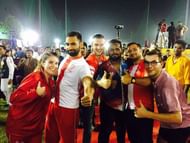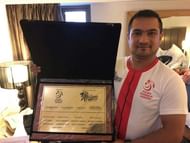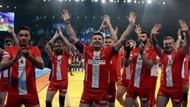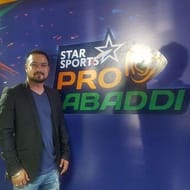As I was waiting in the lobby of a hotel in Ahmedabad (the venue for the 2016 Kabaddi World Cup), a gentleman with the most humble walk trotted across the hall to greet me. From the first look, I knew that this would be a fun interview.
Abhishek Sharma, the man who kickstarted kabaddi in Poland, walked in sporting a Poland blazer, a tika on the forehead and a tattoo on his left arm that read “Garv se kaho, hum Hindu hai” (Say with pride, we are Indians).
Living in Denmark currently and being away from India for the past ten years could not take India out of him. So, it was surprising to see someone investing so much of his time and money in the development of Kabaddi in a foreign land like Poland.
However, by the time we were done with the interview, I, not only, understood why he does this but was also left with one of the most inspiring stories I’ve heard or read ever.
Passion and love are not mere words that he enunciates every time he is asked about his affinity for sports, but something he wears on his sleeve and displays with panache.
“People call me crazy that I am doing this (spending all the money he earns to develop Kabaddi in Poland apart from other sacrifices). We can run after money or career, but the ultimate satisfaction comes from following your passion. I don’t work in the field that I studied because sport is my passion, and that is where I get my happiness from,” he put in words why he does what he does.
Humble beginnings
Coming from a modest background, Abhishek was surrounded by sportsmen all his life with his father a Central Police hockey player and his brother a 17-time national gold medalist in karate. His family also runs their own rifle shooting club in Patiala named ‘Shaheed Bhagat Singh Club’, after the martyred freedom fighter Bhagat Singh.
Having completed his degree in Medical Biotechnology in India, he moved to Poland in 2007 for a dual degree course in MS in Health Economics and M.Phil in Business Administration.
Post completing his course, he started his ‘Kabaddi project’, as he likes to call it. However, the sheer number of mountains he had to cross forced him to put a halt to the dream he had
“I was working on kabaddi since 2010. I am actually a Rifle shooting player and wanted the license to open a rifle shooting club in Poland, but as I was not Polish, I couldn’t get permission despite my best efforts,” he recalled when talking about the setbacks he faced.
It was not long before he found another way to pass the mountain. He was told that if he opened any sports club and ran it for two years, there are much better chances to get a license for rifle shooting after that. It was this switch in fortunes and a report on BBC about Kabaddi being considered for an inclusion in the Olympics that forced him to open a kabaddi club in Poland.
However, running a club requires money, and that was not in abundance in Poland. So, he took up a job in Denmark and started investing every penny he earned into his ‘kabaddi project’.
An unlikely alliance
He recalls that he used to blindly shoot e-mails to every kabaddi association he came across in the hope of a response and help. It wasn’t long till his passion piqued the interest of English coach and International Kabaddi Federation (IKF) member Mr. Ashok Das, who gave him permission to open the club and promised to help him as much as possible on this unique path.
As he decided to approach the Polish government about his proposal, the people guiding him to pursue sports rejected his idea and his proposal never reached the Ministry. They denounced the sport as a “non-European activity” and terming it violent, asking Abhishek to look at a more “European” and “less-violent” sport.
Having worked for two years on this and investing every little bit of money and time he had, he finally gave up, and the project stayed on the back burner for eight months before he encountered an old friend Michal Sosin.
Upon hearing about Abhishek’s plight, Sosin, being a Polish Karate player, used all his contacts to get permission and joined the 31-year-old on his path.
“If Sosin would not have been there, we would not have kabaddi in Poland,” he puts it bluntly highlighting the impact the Pole had. “His ideas, contacts helped massively. He is an entrepreneur, so he knows how to take a project and proceed with it. I remember he slept only 2-3 hours those days. Even now, he is the one who replies to every query and mail.”
He began reminiscing about how searching for the word ‘karate’ on the now defunct Orkut before leaving India for Poland helped him get in touch with Sosin. Having spent nearly three years in Poland with Abhishek, the Pole moved to Ireland, but the friendship remained.
Trust is the glue that binds them together

With the major hurdles crossed, it was down to finding a coach to train the players, and that is where the third and final piece of the jigsaw fell into place. Harwinder Singh, a circle style kabaddi player from Punjab who had moved to Poland around the same time as Abhishek to study Law, was an unexpected boon.
Despite his inexperience in international rules kabaddi, his expertise in circle style kabaddi was invaluable in making the Poles learn the art of this indigenous sport from the sub-continent.
“It was a team effort from our three founders as I invested the money, Michal Sosin the time and Harwinder his expertise,” he firmly replied when asked who he would give credit for giving birth to kabaddi in Poland and nurturing it to where it is now.
The bond between the team is extremely strong, as exemplified by how Sosin shot down an opportunity to kick the “Indian” out of the project and keep it solely to Poles.
“We trust each other blindly, having known each other for almost 10 years. Shockingly, someone had offered Sosin to take the project for himself and kicking me, an Indian, out of the project. But, he firmly rejected any advances and said that the day Abhishek is out of the project, so is he.”
Recruiting Players
With the core management team of the Sharma, Sosin, and Singh in place, they encountered possibly their biggest challenge – convincing the people of Poland to take up kabaddi!
Abhishek explains that it was as hilarious as it was difficult remembering one occasion when he got off his bus despite getting late for work because he saw a sportsperson jogging in the park.
“I am sure he thought I was crazy running with a stranger asking for players for this unheard sport of kabaddi. I showed him our project and our passion. He said he didn’t have time to play, but he assured me that he’ll try to help out. Soon, we got two players from him,” a delighted Sharma said when talking about recruiting his first few players.
Going to Mr. Ashok Das 4 months after Sosin came on board turned out to be a stroke of genius as he sent the English women’s kabaddi team to Poland to demonstrate kabaddi. The event was a massive success and a lot of players from different backgrounds – MMA, American football, karate,etc. – joined in. Mr. Das even pointed out that if they manage to develop some players, he could suggest the names of a few Poland players for the Pro Kabaddi League (PKL), which was in its infancy then.
“We started working on our players. We taught them whatever we knew – be it good or bad. It was learning on the job as none of us were experts in kabaddi. In that time Mr. Das visited us four times to check on our progress.
Soon after, he sent in names of 3 players – Jan Baranowicz, Michal Spiczko and Piotr Karnowicz – to the PKL organisers and luckily enough, Michal, a semi-professional American football player, was selected by the Bengaluru Bulls to become the first European to play in the tournament, a historic moment in Polish kabaddi.
“We would practice from 1:30 – 3 in the night and 6:30 – 8 in the morning.”
Due to the lack of money, all the players and the management team had to continue their jobs. The work makes it difficult for them to train, but they always managed to find time, sacrificing their sleep to achieve their dream.
“Our players are not professional kabaddi players. They work in restaurants, hotels, etc., finishing their work at 11.30 PM. Our timings for practice were between 1.30 and 3 am thrice a week while we also trained from 6.30am to 8 am three times a week,” a nostalgic Sharma reflected on the odd timings they practised to play in the Kabaddi World Cup (KWC).
Talking about the KWC brought an ear-to-ear smile on Sharma’s face as he finally saw his dream materialise in front of his eyes. Despite being in management, he expects his players to show the same aggression he would show if on the mat.
“At the Kabaddi World Cup, there was exposure for everyone. It is extremely difficult to represent your nation in Poland in other sports, but in kabaddi it was easy. Out of a camp of 32, we brought 14 to India to play at the biggest stage,” he explained.

Struggles en route to the Kabaddi World Cup
Being a part of the KWC was fraught with its own challenges. Convincing the IKF to select Poland as one of the two European countries in the tournament was a major task, something that would have been impossible without Mr. Das.
He revealed, “What and where we are today, it is because of Mr. Ashok Das. He contacted the IKF for us, who asked us to show our skills as they had no idea how good or bad our game is.
“Mr. Das organised an inter-college Kabaddi Championship in the UK where we were also invited. We won 5 matches and the gold medal. We sent the videos of that tournament to the IKF, and that helped us get participation in the World Cup,” recalled Sharma.
Although the participation was secured, the training suffered another setback when the visa for the coach designated by the IKF for Poland was rejected mere months before the tournament.
“All the players who represented Poland at the World Cup were recruited six months prior to the tournament, bar 2, who had been with us from 2014. IKF were supposed to send us a coach, but his visa got rejected. We had to come to India without a proper coach. We had to learn through watching videos of other teams and trying to replicate that along with relying on Harwinder’s expert advice,” Abhishek said casting his mind back to surmounting yet another obstacle in their ever-so-inspiring journey.
Lack of help from Indians in Poland
Getting media attention in Poland was quite easy for them as their raider Jakub Szymczyna is an actor. The media lapped up on his star status, and that helped them get 3-4 national TV interviews before the tournament.
As Abhishek admits, the coverage helped them a lot, and the World Cup took the craze to another level in Poland. But, there’s still plenty to learn as Abhishek is still hounded by queries as to what kabaddi is and how to be a part of the set-up.
Despite so many setbacks, the thing that unsettled him during the development of the sport there was the lack of interest shown by the Indians in Poland.
“We have a lot of Indians settled in Poland, but not a single one offered their help. As there was no money, none of the Indians showed any interest,” he lamented.
The World Cup begins, but the struggle continues
When you’re at such a big stage as the World Cup, it is ideal if you have no distractions, but the Polish team, as was evident from their journey so far, was in the eye of a storm. Each of the 3 ‘founders’, as Sharma likes to call them had to encounter troubles during the tournament.
“Moreover, my wedding was scheduled for mid-November, but I couldn’t shift my attention from Kabaddi and had to postpone the wedding to March, much to the chagrin of my family,” Sharma said without any regrets.
Talking about his friends and co-founders, he revealed, “Michal Sosin could only make it to India for 4 days as he got a warning from his employers that they will fire him if he went for a longer duration while he also had to take care of his wife and 2 daughters, one of whom is only 2 months old. Harwinder Singh was fired during the tournament as he was gone for three weeks.”
Despite coming from humble backgrounds, they stood defiant against all the odds and chose their passion over everything else.
“We all agree on one thing – that getting another job is not a problem, but we’ll never sell our sport. The circumstances that we are going are very tough. But, we will have a lot of amazing stories to tell our kids and others,” he smiled thinking about his to-be kids and the astonishing stories they’ll get to hear.
The ‘fake win’ vs. Iran
Iran, the finalists, lost only two matches in the Kabaddi World Cup – the final vs India and a 21-45 loss to the Poles. This result sent shockwaves across the kabaddi world and led to some suggesting that Iran deliberately lost the match to avoid meeting India in the semi-final.
Abhishek, however, remained adamant that it was their physicality and aggression coupled with Iran being over-cautious ahead of the semis that resulted in Poland ending Iran’s winning streak.
“Some people say it was a fake win, but it, definitely, was not. It was our last match, and our boys were determined to end it on a high. Our thought process was very aggressive. Our players knew they weren’t going to play after this and said that if they come in front of us, even they won’t play their next match,” he explained.
“Iran, despite starting with a good team, rested their players soon after, looking at our aggressive and physical style. They wanted to save their players for the semis as well,” he clarified. “That result was a big confidence boost to us. Now we know that if we can beat Iran, we can achieve anything. People back home couldn’t believe the result. They had to see the match again to accept that we pulled this off.”
He also went as far as to claim that they could have made the semis if the fixture list was a little more suited to them as he admitted a loss vs. Kenya was not the ideal start to the tournament.
“Rejigging the fixtures could have helped us more. Let’s say if we had our first match vs. USA (which Poland won 75-29); our confidence would have increased a lot at the start itself and then who knows what we could have achieved. Despite working so hard, we were lagging behind the big teams. We’ll be a force next time, for sure,” remarked the ever-optimistic Sharma as he signed off.
As he walked off, I sat there sipping my tea and considering myself blessed to have heard this bewildering story from the horse’s mouth. Very few, if any, would have done what this ever-smiling gentleman did – shattering all stereotypes and surmounting disconcerting odds to give this completely alien country something to be proud off.
Here’s wishing the world gives rise to more Abhishek Sharma’s and more teams like Poland in the future.

